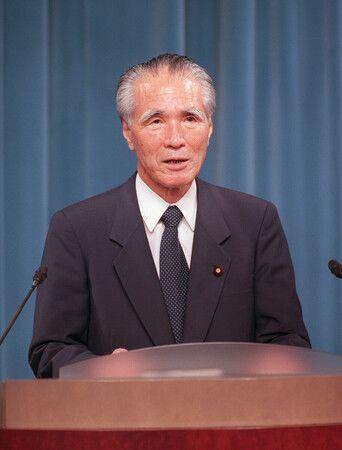In a significant and historic gesture, former Japanese Prime Minister Tomiichi Murayama, a member of the Socialist Party, has issued a landmark apology addressing Japan’s wartime actions. Delivered in a rare and candid statement, Murayama’s apology revisits the nation’s troubled past, acknowledging the suffering caused by Japan during World War II. The move, reported by Reuters, marks a pivotal moment in Japan’s ongoing efforts to confront its history and reconcile with countries affected by its militaristic legacy.
Socialist PM Murayama Delivers Historic Apology for Japan’s Wartime Actions
On a momentous occasion, Prime Minister Tomiichi Murayama, Japan’s first socialist leader, broke decades of silence with a heartfelt apology that acknowledged the profound suffering caused by Japan during World War II. His statement, delivered with unprecedented candor, has been hailed internationally as a significant step towards reconciliation in East Asia. Murayama’s apology explicitly admitted the damage inflicted upon neighboring countries and expressed deep remorse for the actions committed under Japan’s wartime government.
The historic declaration included key elements that set it apart from previous statements:
- Recognition of Responsibility: An unequivocal acceptance of Japan’s role in wartime aggression.
- Emotional Sincerity: Use of compassionate language aimed at healing wounds sustained by victimized nations.
- Commitment to Peace: A pledge to uphold peaceful diplomacy and work collaboratively in the future.
| Aspect | Details |
|---|---|
| Apology Date | August 15, 1995 |
| PM Tenure | 1994-1996 |
| Key Phrase | “Deep remorse and heartfelt apology” |
| Reception | Mixed but largely positive internationally |
Analyzing the Impact of Murayama’s Statement on Regional Diplomatic Relations
Murayama’s apology marked a pivotal shift in Japan’s approach to acknowledging its wartime actions, significantly influencing diplomatic dynamics across East Asia. Neighboring countries, particularly China and South Korea, responded cautiously optimistic, viewing the statement as a rare gesture breaking decades of silence and denial. This unprecedented admission fostered a new environment where historical grievances were recognized openly, allowing for incremental trust-building efforts. However, underlying tensions related to territorial disputes and differing interpretations of history persisted, highlighting that apology alone could not resolve deeply entrenched diplomatic challenges.
The statement also triggered a recalibration of regional alliances. Japan’s willingness to confront its past became a talking point within international forums, shifting perceptions among ASEAN member states and the United States. Key impacts include:
- Improved bilateral talks: Enhanced communication channels with China and South Korea emerged, focusing on economic and security cooperation.
- Increased pressure on nationalist factions: Domestic political groups opposing reconciliation faced criticism, tempering aggressive nationalist rhetoric.
- Boosted regional stability efforts: Shared history acknowledgment encouraged collaborative peace initiatives.
| Country | Initial Reaction | Long-term Effects |
|---|---|---|
| China | Guarded Appreciation | Incremental Trade & Diplomacy |
| South Korea | Conditional Acceptance | Ongoing Historical Dialogues |
| ASEAN States | Supportive Engagement | Enhanced Security Cooperation |
Recommendations for Strengthening Reconciliation and Addressing Historical Grievances
Building a sustainable path toward healing requires acknowledging past errors with sincerity and transparency. Governments can play a pivotal role by institutionalizing educational programs that present an accurate account of historical events, fostering an environment where younger generations understand the depth and consequences of wartime actions. Furthermore, promoting bilateral cultural exchanges and joint historical research initiatives can help bridge gaps in collective memory, creating shared narratives that honor the experiences of all affected communities.
Concrete steps should also be taken to address unresolved grievances through tangible measures. These include:
- Official apologies accompanied by comprehensive reparations or compensation schemes.
- Support programs for survivors and their descendants, focusing on healthcare and social welfare.
- Regular diplomatic dialogues aimed at reinforcing mutual understanding and trust.
| Measure | Purpose | Expected Outcome | ||||||||||
|---|---|---|---|---|---|---|---|---|---|---|---|---|
| Educational Reform | Accurate historical awareness | Long-term reconciliation | ||||||||||
| Official Apologies | Acknowledgment of wrongdoing | Improved diplomatic relations | ||||||||||
| Support for Survivors | Addressing lasting impacts |
Building a sustainable path toward healing requires acknowledging past errors with sincerity and transparency. Governments can play a pivotal role by institutionalizing educational programs that present an accurate account of historical events, fostering an environment where younger generations understand the depth and consequences of wartime actions. Furthermore, promoting bilateral cultural exchanges and joint historical research initiatives can help bridge gaps in collective memory, creating shared narratives that honor the experiences of all affected communities. Concrete steps should also be taken to address unresolved grievances through tangible measures. These include:
|




